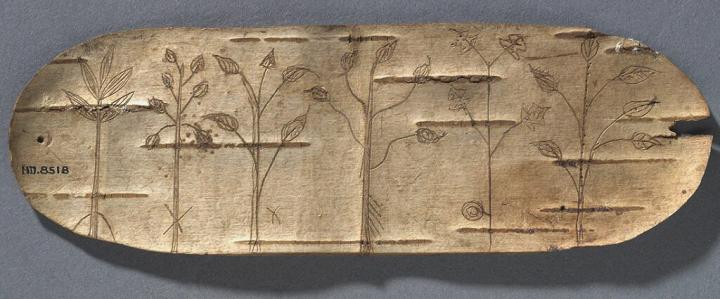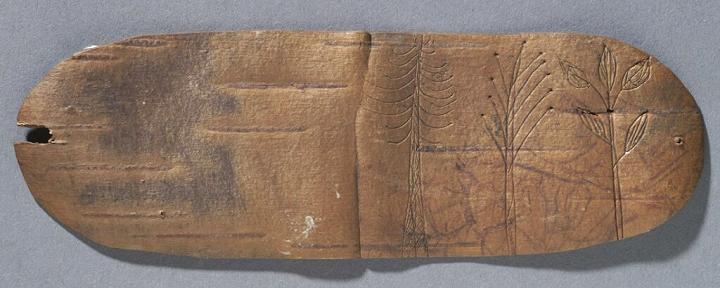 |
Canku Ota
|
 |
|
(Many Paths)
|
||
|
An Online Newsletter
Celebrating Native America
|
||
|
May 2021 - Volume 19
Number 5
|
||
|
|
||
|
1800s Ancestral Scroll
Returns To The Ojibwe
|
||
|
by Deanna Weniger -
St Paul Pioneer Press
|
||
|
St. Paul businessmen
found birchbark artifact on auction website
An Ojibwe scroll lost since the late 1800s is on its way home, thanks to the efforts of two St. Paul businessmen. Sean Blanchet and Robert Snell, owners of Revere Auctions, noticed an Ojibwe birchbark scroll with Minnesota ties pop up on a Boston auction website. Thinking it may be of cultural relevance to the local Ojibwe, Blanchet contacted the auction house and offered to buy it outright. He also reached out for help from other interested parties and donors. On Saturday, he learned the business had taken the scroll out of the auction and offered it to him for purchase, a move that surprised him and pleased advocates of the Ojibwe. “I’m thrilled to see it happen,” said David Chang, a history professor at the University of Minnesota who assisted Blanchet in his appeal. “It is really very meaningful to bring this back home. This is a sacred object, an item that is a living ancestor to practicers of the Mite’iwin religion.”
‘THEY ARE OUR ANCESTORS’ “There are very, very select few people who have actually earned the right to care for them, to read them, to interpret them and use them in ceremony,” explained Shawon Kinew, a member of the Ojibwe tribe and a Harvard professor. “It’s really a privilege that’s earned over years. We consider them to be living beings, and so, to be separated from them is really a very damaging thing.” Skinner Auctioneers in Boston said the piece originated from a private collection in St. Paul. It had changed hands a few times before coming up for sale at Skinner’s. The auction house estimated its value to be between $1,500 to $2,500. The company released a statement on its decision Monday. “Skinner stands alongside all indigenous peoples’ rights claims, and we evaluate each on a case by case basis,” the company said. “In this particular instance, we were able to work with the consignor and affiliates (or a friend of) of the Ojibwe community to develop a solution to address and satisfy all those involved.” For the Ojibwe people, the scroll’s value is immeasurable. “These scrolls are repositories and vessels of the sacred knowledge of the Ojibway,” Kinew said in a letter she wrote to Skinner. “We refer to them as our grandfathers. We care for them as we do biological, human ancestors — we feast and visit with them, we care for them in ceremony.”
HOME TO WHITE EARTH The Ojibwe name, which also can be spelled Ojibway or Ojibwa, is synonymous with Chippewa or Anishinaabe. Their territory once extended across Michigan, Wisconsin, Minnesota and up into Canada. There are seven Chippewa reservations in the state. The scroll will find a new home in the White Earth Reservation which is located in Becker, Clearwater and Mahnomen counties in northcentral Minnesota. Jaime Arsenault, the Tribal Historic Preservation Officer for the White Earth Band of the Minnesota Chippewa Tribe, will oversee the transfer. She was traveling Monday and unable to be reached for comment. RECLAIMING LOST PROPERTY Auction houses, which serve as a middleman between buyers and sellers, have come under fire in the past for negotiating deals involving antiquities from countries or cultures who claim said items were stolen. The United States has, over the past century, tried to curb these types of sales through legislation, especially relating to Native American culture. The laws provide a process for tribes to make a claim to repatriate items they believe belong to them. The claims take time and money and, unless the items are human remains, the question of who really owns them is often disputed. A claim can also attract attention and drive up the value of the item, as it did in 2018 in southern Minnesota with a pipe owned by a Dakota chief from the late 1800s. The Prairie Island Indian Community in Red Wing made a claim for the pipe, but was unsuccessful. Because the claim was in dispute, the donor, representing the tribe’s interests, was forced to bid on it. By the time it sold, the price had doubled the high estimate. To the relief of the Indian community, the buyer, who paid $40,000 for it, donated it back to Prairie Island. HOW AUCTION HOUSES CAN HELP Advocates, like Blanchet and Snell, would like to see auction houses give interested communities the opportunity to purchase the items before they go to auction and disappear into private collections. The two move quickly to notify interested parties whenever they come across a culturally sensitive item. Ideally, they would like to see the consignor donate the item back to the tribe, but in most cases, the item will need to be purchased. Revere Auction fronted the money to buy the scroll once Skinner took it out of the auction. Donors will help reimburse the costs. Blanchet, whose parents both worked for the Indian Health Service in the medical field, said his upbringing exposed him to the Native American culture and gave him an understanding of what items, like the scroll, mean to those communities. He and Snell learned about the role auction houses can play in advocating for the return of these items, after putting several Native American items up for auction a few years ago. They were contacted by the Association on American Indian Affairs which works to bring cultural items home. “Now we write to the tribes right away and ask, ‘Hey, is this significant?'” Blanchet said. “They are shocked that an auction house would care what they think.” Revere also will put a sevenday hold on items going through their business to give tribes a chance to make a claim and acquire the item, either by donation or by raising funds, before it goes to auction. In the past few years, they’ve returned a pipe, a fly whisk and a ceremonial ghost dance shirt. Blanchet suspects Skinner’s good-will gesture means a shift in policy. “This shows that they are signaling a more progressive leadership position in terms of the handling of sensitive cultural properties,” he said. Deanna Weniger can be reached at 651-228-5556 and dweniger@pioneerpress.com, or on Twitter at @dlweniger. |
||||
|
|
|
|
||
|
|
||
| Canku Ota is a free Newsletter celebrating Native America, its traditions and accomplishments . We do not provide subscriber or visitor names to anyone. Some articles presented in Canku Ota may contain copyright material. We have received appropriate permissions for republishing any articles. Material appearing here is distributed without profit or monetary gain to those who have expressed an interest. This is in accordance with Title 17 U.S.C. Section 107. | ||
|
Canku Ota is a copyright ©
2000 - 2021 of Vicki Williams Barry and Paul Barry.
|
||
 |
 |
|
|
The "Canku
Ota - A Newsletter Celebrating Native America" web site and
its design is the
|
||
|
Copyright ©
1999 - 2021 of Paul C. Barry.
|
||
|
All Rights Reserved.
|
||


